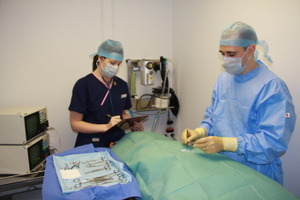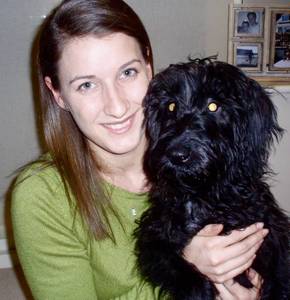15% off all cat & dog neutering in March
At Hollybank Vets we recommend neutering all pets that you do not wish to breed from. The routine procedures are normally very quick without any complications, especially if performed at a young age. Even though we consider these procedures ‘routine’, we use sterile disposable gloves, gowns and drapes for every patient – unlike many other vets.

Females of any species are spayed. The ovaries and uterus are removed in this procedure. This means that not only will they no longer have seasons and or able to get pregnant, they are also protected against a number of diseases that can affect the reproductive tract including ovarian and uterine cancers and pyometra. Pyometra is a life-threatening infection of the uterus most frequently seen in bitches and commonly occurs following a season, especially in older pets. The only treatment is spaying and this often has to be undertaken on very sick animals.
At Hollybank vets we recommend spaying PRIOR to the first season in accordance with current evidence and advice from experts. It is not necessary to let your pet have a season first and actually spaying before their first season has been proven to hugely reduce their chances of mammary tumours (breast cancer) – by approximately 25 times! We therefore recommend spaying female dogs at 5-6 months of age. At this age pets recover from the surgery and anaesthetic very quickly and usually bounce home as if nothing had happened!
Males are castrated. In this process the testicles are removed. This means that they can no longer reproduce and also some of the unwanted behaviours such as mounting, marking territory and being very excitable can be either be reduced or stopped. We recommend castration from 5- 6 months of age. The procedure can be done later but often those undesirable behaviours can become learnt if they are left for too long – and then even castration won’t stop them! The health benefits for male dogs include eliminating the risk of testicular cancer and reducing the frequency of prostate disease.
Cats can be spayed or castrated from 4 months of age in accordance with current guidelines. We recommend keeping entire cats indoors until this has been done as female cats can get pregnant from a very young age and male cats can roam far before neutering.
We can spay and castrate other species too – including rabbits, ferrets and guinea pigs. Rabbits, especially females can often be aggressive to other rabbits and humans when they are in season – neutered rabbits are often much friendlier.
If you would like to discuss neutering your pet further then do contact us at the surgery any time. Some people can be apprehensive about the procedures but generally recovery is very quick and actually keeping your pet rested for 5 days until we see them back is the hardest part!



